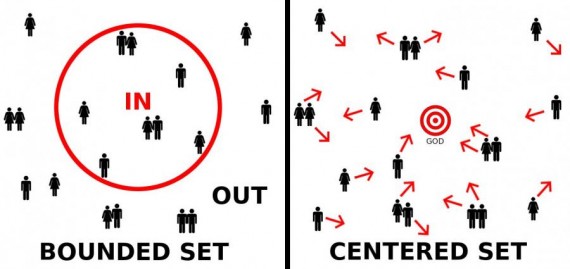
In the past few posts, I have discussed Bounded Sets vs. Centered Sets, and have stated that I believe that one of the best approaches for churches in our culture and society is a Centered Set approach, where there is no “us vs. them” mentality, or trying to decide who is “in” and who is “out.” Instead, we place Jesus Christ at the center of all humanity, and then view ourselves and others in relation to our proximity to Him, and our movement either toward or away from Him. In this way, everybody is “in.” Everybody belongs. Everybody can get involved.
Some fear that a Centered Set approach leads to Universalism, that all people are “saved.”
Does Centered Set Theology Lead to Universalism?
 I don’t think a Centered Set approach leads to universalism. To the contrary, I think a Centered-Set approach best reflects biblical theology.
I don’t think a Centered Set approach leads to universalism. To the contrary, I think a Centered-Set approach best reflects biblical theology.
First, when we say that all people are “in” we don’t mean that all people are justified or have eternal life. At least, I don’t mean this.
I believe that on the cross, Jesus Christ actually paid for the sins of the entire world. Not potentially, but actually. He really did pay for the sins of the entire world. Everyone is forgiven. Every single man, woman, and child is completely forgiven for every sin, past, present, and future. (Except for the sin of blasphemy against the Holy Spirit. But I am not about to get into that issue here.)
But if everyone has their sins forgiven, how does this not lead to universalism?
Because eternal life is not a result of having our sins forgiven, but a result of receiving the positive righteousness of Jesus Christ, which comes by faith alone in Him. It is not enough to have the slate wiped clean and be forgiven. We must have the name of Jesus and His righteousness written in bold letters across the top of our life. On the cross, Jesus wiped the slate clean for all humanity. But only through faith in Him does Jesus write “Righteous” on our soul.
A Theology of Acceptance
So in this way, all are accepted. All are forgiven. All barriers are destroyed. All walls have been torn down. There is no longer a dividing line. The community of people accepted by God is not bound by a circle with some inside His love and everyone else outside. It is not a bounded set.
 I used the image of a watering hole in Africa previously, but another helpful image is a galaxy. A galaxy is made up of trillions of stars all gathered around a blazing center. While many of the stars are gathered in the center, some of the stars are further out. Yet due to gravity, all are being pulled toward the center.
I used the image of a watering hole in Africa previously, but another helpful image is a galaxy. A galaxy is made up of trillions of stars all gathered around a blazing center. While many of the stars are gathered in the center, some of the stars are further out. Yet due to gravity, all are being pulled toward the center.
In the world of humanity, Jesus is the center and all of us are in proximity to him. He is drawing all people to Himself. We cannot draw a circle around Jesus and say “Once you cross this line” you are now accepted and loved by Him. Jesus doesn’t operate this way, and neither should we.
Yes, there is the biblical concept of being “in Christ.” I do not believe that everybody is “in Christ” but only those who have believed in Him for eternal life. So in this sense, I suppose, there is a bounded set, but it is a spiritually bounded set, and nearly impossible to discern with our physical eyes, limited knowledge, and biased reason. As I have said repeatedly, we must leave this sort of judging up to Jesus. He alone knows for sure who is “in Him” and who is not.
So if we can trust Him with determining the eternal destiny of others, we can do what He has called us to do, by welcoming and encouraging everyone to draw ever closer to Jesus Christ by following Him and His teachings.
Following Jesus

In this way, following Jesus is not about sliding scales of orthodoxy, compartments or titles. It’s not about signing on the doctrinal dotted line. While there may be disagreements about certain points of theology, we can still love another other and serve others in the name of Jesus. We can see others not as foes and enemies, but as people who are on the other side of the galaxy from where we are at. And though the way they may see things appears alien to us, there are still some things we can learn from them and they can learn from us as we both swirl around Jesus.
Though I wouldn’t call this universal proximity to Jesus “the church” it does provide the church with a universal task, and universal openness to people of all backgrounds, all beliefs, and all behaviors. It eliminates judging, for there is no creed or checklist by which we can determine who has crossed the line. Indeed, there is no line. There is only the center, and the center is Jesus Christ.




Jeremy I just love you to bits, you are so logical, sensible, sensitive and humble. All the stuff you have been teaching us has been so helpful and affirming. I use what you have said in my Bible study groups to help explain things better. I will certainly be using the ideas where there are no barriers or hurdles to jump to be accepted into the Church.
Thank you, your brother in Christ Clive.
Clive,
Don’t praise me too much… I get scared and nervous. And one of these days, I will doubtless say something that you strongly disagree with! Just remember that I want to learn from you as well!
Hi, interesting stuff. Just read The Evangelical Universalist. Curious why you’re keen your model doesn’t lead you to universalism. If Jesus is drawing all people to himself, if judgement is about putting all things right, if Gods goal is the reconciliation of all creation then whatever judgement and punishment happens to seek to achieve this end, how can we say love never fails, if in this ultimate instance, it does, by leaving anyone lost for all eternity? .